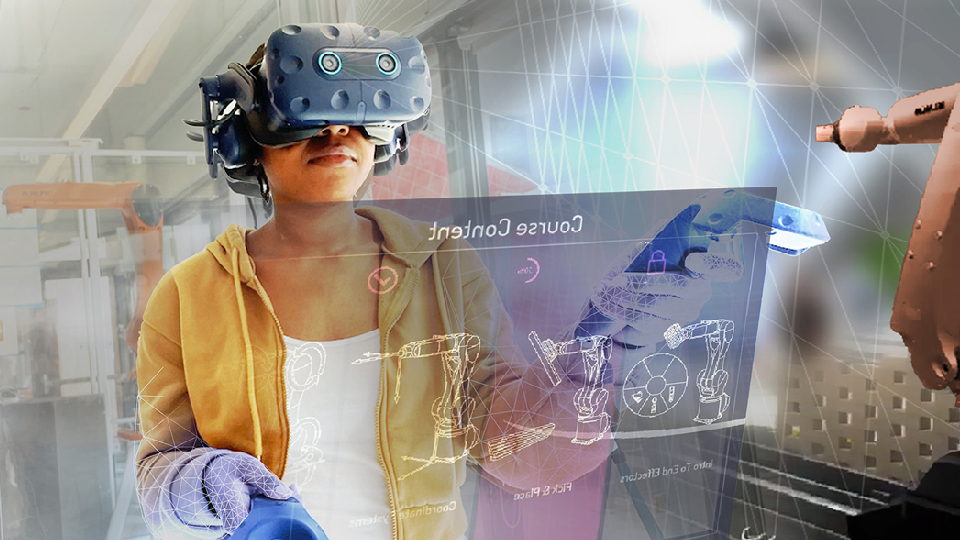FIU FACULTY AWARDED A $750K NSF GRANT FOR AN IMMERSIVE LEARNING ENVIRONMENT FOR ROBOTICS
Link
The National Science Foundation, Research on Emerging Technologies for Teaching and Learning (NSF:
RETTL) program has awarded an interdisciplinary team led by FIU faculty from the College of Communication, Architecture + The Arts (CARTA’s) School of Architecture and the College of Engineering and Computing’s Knight Foundation School of Computing and Information Sciences grant funding to develop a personalized learning platform for robotics operations. The FIU team, in collaboration with learning scientist, Seth Corrigan from the University of California- Irvine, and Dr. Shu-Ching Chen a data scientist at the University of Missouri-Kansas City received funding to focus on integrating Machine Learning (ML), Natural Language Processing (NLP), and Virtual Reality (VR) to create a personalized game-based learning environment. This immersive environment aims to deliver an industrial robotics curriculum that responds to individual learners’ needs. This project will contribute to diversifying STEM-based programs offered by FIU and equipping future students with the capability to engage emerging robotic technologies to enhance their skill sets. According to the U.S. Bureau of Labor Statistics, STEM occupations will see an 8% growth from 2019 through 2029 due largely to the increased development of the Internet of Things (IoT), AR, ML, and robotics technologies.
“This grant provides an opportunity to develop a personalized learning tool that tailors robotics lessons and their delivery sequences for differences in ability, experience, and sociocultural backgrounds,” said Dr. Shahin Vassigh, Director of FIU’s Robotics and Digital Fabrication (RDF) lab, Co-Director of the Integrated Computer Augmented Virtual Environment (I-CAVE), and the project’s Principal Investigator. Embracing its labs and facilities, the College of Communication, Architecture + The Arts, certainly furthers its impact within and outside of the University. FIU’s efforts on engaging in innovative projects, partnerships, and collaborations are undoubtedly driving the tech and innovation economies by creating a pipeline of highly skilled graduates who are both filling and creating jobs in South Florida and beyond. The funding is indeed a testament to the cutting-edge projects that grow from innovation hubs within the College’s School of Architecture and the College of Engineering and Computing. Dr. Mark Finlayson, Eminent Scholar Chaired Associate Professor of Computer Science, and co-Principal Investigator added that this project would enhance research on the benefits of utilizing such technology in education. "This project will help us drive forward an area of critical importance, namely, the application of AI and Natural Language Processing technologies to the analysis of learning data,” said Dr. Finlayson. “This kind of work will be an important step in understanding how to bring AI benefits to education research and give education researchers a model to follow in the use of cutting-edge NLP analyses." Biayna Bogosian, Assistant Professor of Architecture, also a co-Principal Investigator of the project will lead the Virtual Reality component of the project, she believes that “Immersive media have the promise to transform learning by creating embodiment, interaction, and real-time information exchange between the learners and the virtual or physical learning environments. Another member of the team Eric Peterson, a Teaching Professor of Architecture, stated "Through this grant, we hope to show how leveraging robotic simulation and immersive technologies can help break down technical and economic barriers to entry in robotics, and more equitably pair talent with know-how.”
Dr. Madeline Gannon a returning alumnus of the Architecture program, who will be leading the curriculum team, shared her enthusiasm for the project “I’m excited to help unlock highly technical skills in robotics for more general audiences. Up until now, learning robotics has required a steep, upfront investment in physical hardware, equipment, and space. Through this grant, we hope to show how leveraging robotic simulation and immersive technologies can help break down technical and economic barriers to entry in robotics, and more equitably pair talent with know-how”. The School of Architecture, which celebrates its 25 th anniversary this year, ranked No. 2 in Florida and tied for No. 16 in North America among public universities in the 2022 QS World Rankings by Subject and No. 19 nationwide in the design intelligence “Most Hired from Architecture Schools” category. The NSF grant speaks to the future of architecture and design, and how the School of Architecture continues to propel ground-breaking research in this area.

